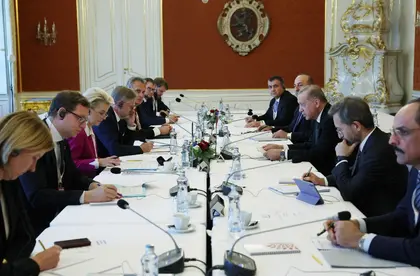Below are the main points of European Political Community (EPC) event based on the article written by Sam Greene, Edward Lucas and Nicolas Tenzer at the nonpartisan, nonprofit, public policy institution CEPA.
In an address to the European Parliament on May 9, 2022, French President Emmanuel Macron proposed the European Political Community as “a new European organization” that would allow countries “that subscribe to our shared core values to find a new space for… cooperation” on politics, security, energy, infrastructure, investment, and migration.
JOIN US ON TELEGRAM
Follow our coverage of the war on the @Kyivpost_official.
Macron was quick to add that membership in the EPC “would not prejudge future accession to the European Union,” but noted that the organization could serve as at least a temporary stand-in for EU integration, a process that could take years or decades.
The EPC thus assembled summit was in Prague Castle with a mission to “foster political dialogue and cooperation to address issues of common interest” and “strengthen the security, stability, and prosperity of the European continent.” Leaders confirmed that the EPC would be an “informal platform” and hence “not… a substitute for EU policies, in particular enlargement.”
One of the EPC’s key strengths is in its ability to transcend the EU itself, and to project a broader vision of Europe in which the EU is important, and perhaps dominant, but not alone. The EPC might also provide a way for a broader Europe to produce and project solidarity where the EU itself stumbles, whether with respect to Ukraine or the “middle ground” countries of Africa, Asia, and the Americas.

World Briefing by Michael Bociurkiw: January 14, 2025
It is in this direction of expansive, continent-wide policy thinking that the Moldovan government, as hosts of the EPC’s second summit, has sought to focus their colleagues’ attention. Moldova — as both a candidate for EU accession and a country effectively under attack from Russia — sits at the confluence of many of the problems the EPC needs to address.
On the one hand, Moldova (like Ukraine) cannot afford to wait until it is an EU member to get the support it needs for its military, economic, and societal security: The Chişinău authorities need help now.
On the other, Maia Sandu and her government are acutely aware that the short-term decisions made now on regulation, infrastructure, and governance will play a critical role in the speed and smoothness of Moldova’s EU accession.
As a result, Chişinău has begun to outline an EPC agenda that focuses on exactly these confluences:
• Outlining an integrated approach to energy infrastructure and interconnectedness.
• Setting standards and facilitating investment and technology transfer to ensure the new energy infrastructure is not only secure but green.
• Securing Moldova’s and other countries’ digital spaces, currently under attack from Russia, compatibly with the trajectory of European digital regulation.
Each of these policy areas is ideally suited to the EPC. They all intimately bind countries in Europe’s east with those in Europe’s west, require continent-wide discussion and coordination. Also, it cannot be solved by the EU alone. And, while they overlap with the enlargement process, require more urgent action than EU enlargement can accommodate.
According to the CEPA authors, the EPC’s proponents should understand the degree to which its future is tied to the outcome of the war in Ukraine. An incomplete victory for Ukraine — which would inherently mean a form of victory for the Kremlin — would fracture the EPC and contribute to the fracturing of Europe as a whole.
A victory for Russia would destabilize all European countries, but particularly those that, left outside the protective umbrellas of the EU and NATO, are most vulnerable. Destabilization on Europe’s periphery, in turn, would harden borders, heighten tensions, and encourage everyone to look inward.
A victory for Ukraine, by contrast, would herald a future of rapprochement, common cause, and, eventually, greater democracy. It could have a positive effect on those EPC countries whose governments have continued to look toward Moscow.
The EPC can play a role in bringing that victory about, but without that victory, the EPC’s goals cannot be achieved.
You can also highlight the text and press Ctrl + Enter










